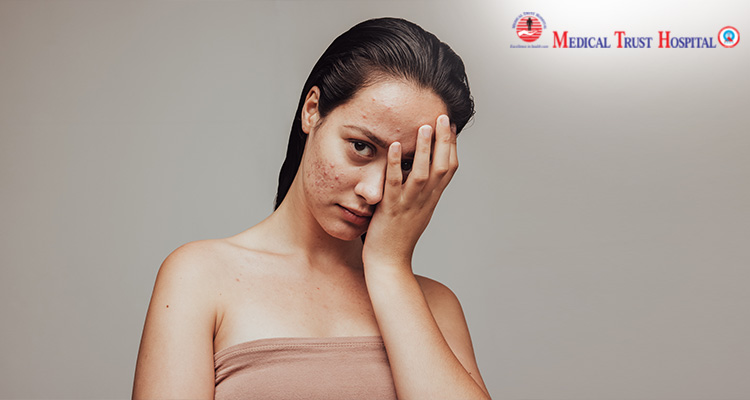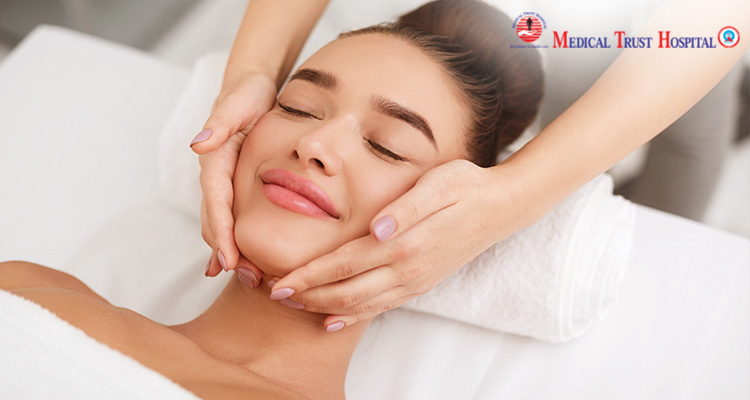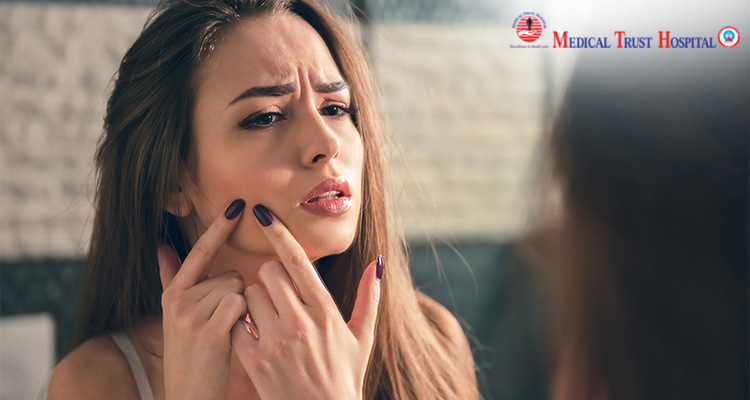If you are facing any skin concerns, seeking help from a dermatologist is crucial. Dermatologists are medical experts specializing in diagnosing and treating various skin conditions. From acne to eczema, dermatologists possess the knowledge and expertise to address these issues effectively. In Kochi, a vibrant city in Kerala known for its healthcare facilities, there are several highly skilled dermatologists available to provide top-notch care. This article will explore some of the most common skin conditions treated by dermatologists and highlight some of the best dermatologists in Kochi who can offer their expertise and assistance. Whether you are dealing with persistent acne or troubling rashes, this article will guide you towards finding the right dermatologist who can help restore your skin’s health and beauty.
Here are some Common Skin Conditions

Acne
Acne is a common skin condition that affects people of all ages. It is caused by a buildup of oil and dead skin cells in the hair follicles. This buildup can lead to inflammation and the formation of pimples, blackheads, and whiteheads.
There are a number of different ways to treat acne. Mild acne can often be treated with over-the-counter medications, such as benzoyl peroxide or salicylic acid. More severe acne may require prescription medications, such as antibiotics or retinoids. In some cases, laser or light therapy may also be used to treat acne.
Here are some tips for preventing acne:
- Wash your face twice a day with a gentle cleanser.
- Avoid touching your face throughout the day.
- Use oil-free cosmetics and moisturizers.
- Don’t pick or squeeze your pimples.
- Get regular facials from a qualified esthetician.
Eczema
Eczema is a chronic skin condition that causes the skin to become red, itchy, and inflamed. It is a common condition that affects people of all ages, but it is most common in children. There are different types of eczema, but the most common type is atopic dermatitis. Atopic dermatitis is thought to be caused by a combination of genetics and environmental factors.
The symptoms of eczema can vary depending on the type of eczema and the severity of the condition. However, some common symptoms include:
- Red, itchy skin
- Dry, flaky skin
- Rashes
- Blisters
- Sores
There is no cure for eczema, but there are treatments that can help to manage the symptoms. The best treatment for you will depend on the severity of your eczema and your individual needs.
Some common treatments for eczema include:
- Moisturizers: Moisturizers help to keep the skin hydrated and can help to reduce itching.
- Topical steroids: Topical steroids can help to reduce inflammation and itching.
- Antihistamines: Antihistamines can help to reduce itching.
- Phototherapy: Phototherapy is a treatment that uses ultraviolet light to reduce inflammation.
Psoriasis
Psoriasis is a chronic autoimmune disease that causes the rapid buildup of skin cells. This buildup causes scaling and inflammation on the skin. Psoriasis can affect any part of the body, but it most commonly affects the scalp, elbows, knees, and lower back. There is no cure for psoriasis, but there are treatments that can help to manage the symptoms. The best treatment for psoriasis will vary depending on the severity of the condition and your individual needs.
Some common treatments for psoriasis include:
- Topical treatments: Topical treatments are applied to the skin and can help to reduce scaling and inflammation. Some common topical treatments for psoriasis include corticosteroids, vitamin D analogues, and retinoids.
- Phototherapy: Phototherapy is a treatment that uses ultraviolet light to reduce scaling and inflammation. Phototherapy can be done in a doctor’s office or at home.
- Systemic medications: Systemic medications are taken by mouth or injection and can help to reduce scaling and inflammation. Some common systemic medications for psoriasis include methotrexate, cyclosporine, and acitretin.
- Biologics: Biologics are a type of medication that targets the immune system and can help to reduce scaling and inflammation. Some common biologics for psoriasis include adalimumab, etanercept, and infliximab.
If you are experiencing psoriasis, it is important to see a doctor to get the best treatment for your individual needs.
Here are some additional information about psoriasis:
- Causes: The exact cause of psoriasis is not fully understood, but it is thought to be due to a combination of factors, including genetics, environmental triggers, and the immune system.
- Symptoms: The symptoms of psoriasis can vary depending on the severity of the condition. However, some common symptoms include:
- Scaling: The skin may become red and covered with thick, scaly patches.
- Inflammation: The skin may become red, swollen, and itchy.
- Pain: The skin may become painful, especially when it is scratched.
- Prevention: There is no sure way to prevent psoriasis, but there are some things you can do to reduce your risk, such as:
- Quit smoking: Smoking can trigger psoriasis flare-ups, so quitting smoking can help to reduce your risk.
- Manage stress: Stress can trigger psoriasis flare-ups, so it is important to find ways to manage stress.
- Get enough sleep: Getting enough sleep can help to reduce inflammation and improve your overall health.
Skin Cancer
Skin cancer is a disease in which cells on the skin grow out of control. It is the most common type of cancer, accounting for about 30% of all cancers. There are many different types of skin cancer, but the most common are basal cell carcinoma, squamous cell carcinoma, and melanoma.
Basal cell carcinoma is the most common type of skin cancer. It usually appears as a small, smooth, pink or flesh-colored bump on the skin. Squamous cell carcinoma is the second most common type of skin cancer. It usually appears as a red, scaly patch on the skin. Melanoma is the least common type of skin cancer, but it is the most serious. It usually appears as a dark, irregular mole on the skin.
The best way to prevent skin cancer is to protect your skin from the sun. This means wearing sunscreen, a hat, and sunglasses when you are outdoors. You should also avoid tanning beds.
If you find a suspicious growth on your skin, it is important to see a doctor right away. Skin cancer is often treatable if it is caught early.
The treatment for skin cancer depends on the type and stage of the cancer. Some common treatments include:
- Surgery: Surgery is the most common treatment for skin cancer. The doctor will remove the cancerous growth and some surrounding healthy tissue.
- Radiation therapy: Radiation therapy uses high-energy beams to kill cancer cells. It is often used to treat skin cancer that has spread to other parts of the body.
- Chemotherapy: Chemotherapy uses drugs to kill cancer cells. It is not often used to treat skin cancer, but it may be used in combination with other treatments.
If you are diagnosed with skin cancer, it is important to follow your doctor’s instructions carefully. The outlook for people with skin cancer is very good if the cancer is caught early and treated appropriately.
Here are some additional information about skin cancer:
- Causes: The exact cause of skin cancer is not fully understood, but it is thought to be due to a combination of factors, including exposure to ultraviolet (UV) radiation from the sun or tanning beds, genetics, and certain skin conditions.
- Symptoms: The symptoms of skin cancer can vary depending on the type of cancer. However, some common symptoms include:
- A new or changing mole
- A growth or sore that does not heal
- A scaly patch or red area on the skin
- A bleeding or crusty growth
- Complications: In some cases, skin cancer can spread to other parts of the body. This is called metastatic skin cancer. Metastatic skin cancer is a serious condition, but it can be treated with chemotherapy, radiation therapy, and other treatments.
- Prevention: There is no sure way to prevent skin cancer, but there are some things you can do to reduce your risk, such as:
- Avoiding too much sun exposure
- Wearing sunscreen, a hat, and sunglasses when you are outdoors
- Avoiding tanning beds
- Checking your skin regularly for any changes
How to Choose the Best Dermatologist in Kochi for You

When it comes to taking care of our skin, finding the best dermatologist is crucial. Whether you have a specific skin concern or simply want to maintain a healthy complexion, choosing the right dermatologist can make all the difference in your skincare journey.
In the vibrant city of Kochi, known for its rich cultural heritage and modern amenities, there is no shortage of dermatologists available. However, with so many options to choose from, how do you find the best one for you?
Conclusion
In conclusion, Medical Trust has proven itself to have the best dermatologist in Kochi. With their team of highly skilled and experienced professionals, they have consistently delivered outstanding results and provided top-notch care for their patients. Their commitment to staying updated with the latest advancements in dermatology ensures that they are equipped with the knowledge and skills needed to provide the best treatments. Whether it is acne, skin allergies, or any other skin condition, patients can trust that they will receive personalized and effective treatment at Medical Trust. Don’t hesitate to schedule an appointment with them today and experience the exceptional care for yourself.
